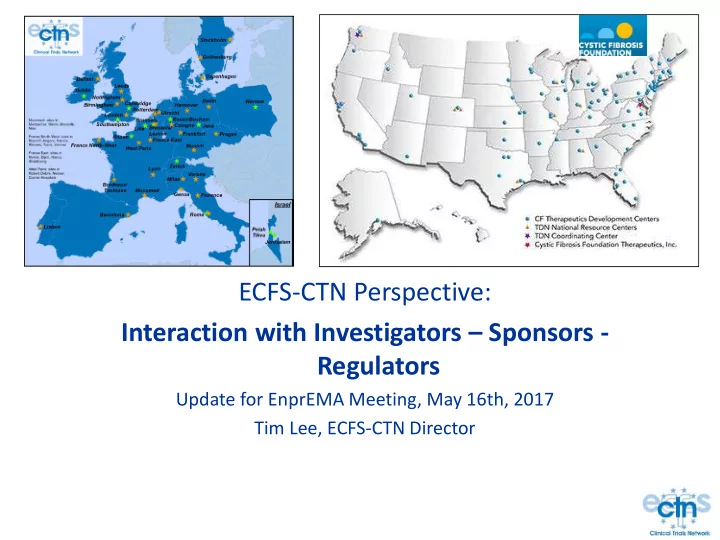

ECFS-CTN Perspective: Interaction with Investigators – Sponsors - Regulators Update for EnprEMA Meeting, May 16th, 2017 Tim Lee, ECFS-CTN Director
How do the Clinical Trial Networks add value? • Experts in delivering clinical trials in the population in question (country and/or disease specific) – especially feasibility • Know best countries/sites for specific study requirements • Dealing with whole pipeline – see full context (although much of this will be confidential) • Involve patients in prioritisation/feasibility • No conflict of interest (other than wanting best outcome for patients)
Cystic Fibrosis Landscape • A rare disease (75,000 affected worldwide) • Life shortening (current UK predicted life expectancy 45.1 years 1 improving rapidly) • Current very active pipeline from multiple pharma - CFTR modulator drugs (potential for considerable gains in life expectancy) - Mucolytics to reduce chest infections/scarring - Improved antibiotics including inhaled therapies - Anti-inflammatories to reduce lung scarring - Treatments for pancreatic/liver/GI disease seen in CF • CFTR modulator drugs approved so far very expensive, not available in many countries 1) UK CF Registry 2016
Current challenges (1) • In a rare disease drug development costs can rapidly lead to new drugs being unaffordable for some Healthcare Providers http://www.pharmafile.com/news/503575/nice-draft-guidance-says-no-cystic-fibrosis-drug-orkambi https://www.thetimes.co.uk/article/german-deal-sets-high-price-for-orkambi-pkkls0lc8
Current Challenges (2):We need a worldwide CF clinical trials strategy in age of CFTR modulators Studies more deliverable Very large studies may be needed Costs/blinding of active comparator Mayer-Hamblett N et al. Thorax 2016
Alternative study designs: • For example: 1 month withdrawal from standard of care modulator Needs careful safety monitoring Pre-determined stopping criteria Mayer-Hamblett N et al. Thorax 2016
Sponsor – ECFS-CTN Interaction Some sponsors approach CTN before PIP submitted Most sponsors approach CTN after PIP with individual study protocols but before protocol is finalised Once CDAs arranged discussion about CTN processes and specific study questions between sponsor and CTN Director and CTN Co-ordinator Protocol Review Agreement and CTN Protocol Review Protocol accepted to run in CTN Protocol deferred Protocol not accepted with specific feedback with specific feedback to run in CTN Protocol may run outside CTN Sponsor responds to feedback Sponsor responds to feedback Or sponsor may go back to regulator Protocol may be amended Protocol may be amended Or protocol may not progress Feasibility agreement – Site Feasibility Questionnaire Regular telcos/meetings between Sponsor and CTN Director and Site selection and study set-up Study runs CTN Co-ordinator
Advocacy for patients to sponsors– examples • Guaranteed Enrollment Plan for Sites – across most CFTR modulator studies • Anti-inflammatory study: Request for further safety data • Infant study: Request for data showing effect on lung development • Successful lobbying that subjects involved in early CFTR modulator studies should not be excluded from later studies • Protocol feasibility – impact on work and school attendance - endpoints that are minimally disruptive/unpleasant • Speed of safety reporting back to sites • Improving Screening experience and efficiency eg genotype reporting • Suggesting Registry type studies are conducted by existing Registries • Advised sponsors on concerns about ultimate drug costs
Interactions with Regulators Participation in EMA workshop to standardise outcome measures and priorities for CF Clinical • Trials – and ongoing general advice/consultation (both ways) - Importance of In Vitro assays on Intestinal Organoids for predicting response for CF patients with rare CF mutations Responsed to EMA scoping Document Revision of Guideline on Clinical Development of New • Treatments for people with Cystic Fibrosis (CHMP/EWP/9147/08) and encouraged responses from other stakeholders (eg Sponsors; Patient Organisations; US Cystic Fibrosis Foundation Therapeutics Development Network). Liaise with US Cystic Fibrosis Foundation Therapeutics Development Network over • interactions with FDA Regularly invite speakers with regulatory expertise to our ECFS-CTN Steerco meetings to • discuss changing landscape and strategic priorities Involvement in Enpr-EMA committees and working groups •
ECFS-CTN – Thank you Katia Reeber Tim Lee Els Aertgeerts Veerle Bulteel Kate Hayes Co-ordinating Centre Team ECFS-CTN Site Leads, Basel June 2017 Fiona Dunlevy Quality Manager
Recommend
More recommend